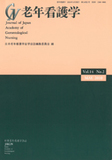Japanese
English
- 販売していません
- Abstract 文献概要
- 参考文献 Reference
目的:本研究は,老年者に対する対話志向性尺度の妥当性と信頼性を検討することである.
方法:前研究のデータにより,4因子15項目の尺度モデルを同定し,構成概念妥当性,信頼性を検討した.また,別の調査協力者に6つの尺度を実施し,併存的妥当性を検討した.
結果と考察:対話志向性の潜在変数に対するパス係数は,第1因子「かかわりへの戸惑い」0.84,第2因子「かかわりへの懸念」0.54,第3因子「かかわりへの偏見」0.37,第4因子「かかわりの困難さ」0.74であった.対話志向性尺度モデルの適合度指標は,GFI=0.952,AGFI=0.933であり,因子間の識別も妥当で,構成概念妥当性は確かめられた.折半法では,相関係数はρ=0.74(p<0.001),α係数は,各因子では0.67から0.76と,内部一貫性は高い. GP分析では,上位群─下位群のすべての項目で平均得点の差があり,信頼性は確かめられた.対話志向性尺度は,アサーティブマインドスケール,共感的理解尺度との間で負の相関を示した.因子間では,第2因子が「目上への不安」(r=0.73,p<0.01)因子と部分的に併存的妥当性を確かめた.また,各因子との特異的な相関が得られ,因子の特徴と独立性を立証することができた.
Aims : This study sought to confirm the validity and reliability of the Dialogue Preference Scales for Elderly (DPSE).
Methods : Based on data from preceding research, a 15-item measurement model was developed, for which construct validity, concurrent validity, and reliability were examined. Concurrent validity was also examined for six measures applied to other students.
Results and discussion : The path coefficients of the resulting four relationship-related DPSE factors were: bewilderment (0.84); anxiety (0.54); bias (0.37) and communication (0.74). The indices of fit for the DPSE model were 0.952 for GFI, and 0.933 for AGFI. Distinction between factors was good, thereby confirming construct validity.
Using the split-half reliability method, the correlation co-efficient was ρ = 0.74 (p<0.001) and the reliability co-efficient was from 0.76 to 0.67 for each factor, confirming high internal consistency. The average score of good─poor groups in all items for the Good─Poor Analysis was significant, and confirmed reliability.
A negative significant correlation was detected between the DPSE and the Assertive Mind Scale and the Empathetic Understanding Measure. Factor two, anxiety in the relationship, correlated significantly with authoritative anxiety (r=0.73, p<0.01), thereby confirming part of concurrent validity.
Conclusions : The DPSE is a four-factor 15-item scale with confirmed validity and reliability. This scale assessed nursing students’ negative tendencies in cognition and attitudes when conversing with elderly clients. Specific correlation with each factor was found, and the features and independence of factors were proved.
Copyright © 2010, Japan Academy of Gerontological Nursing All rights reserved.


